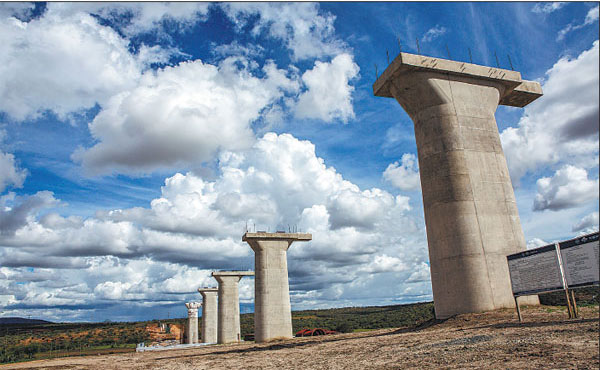 |
|
Pillars built for a super-bridge near the town of Kiu during the construction. [XIE SONGXIN/CHINA DAILY] |
"You see the challenge of the trucks (on Mombasa Road)," Atanas Maina, managing director of Kenya Railways Corp, said.
The damage to the road is significant. The pollution is pervasive. With the single-gauge railway, one train, which can carry up to 200 containers, can get about 100 trucks off the road.
"One single train will be able to transport up to 1,000 people in four hours from Mombasa to Nairobi. There will be a big, big change. We will be able to move our people between the corridors very, very fast," Maina said.
Even during the construction, changes have taken place along the line with increased business activity. Maina said that people who were compensated in land acquisition now have the money to "undertake a lot more economic activities".
"In the entire corridor between Mombasa and Nairobi you will find a lot of businesses have sprung up," Maina said.
Experts say the increased mobility that the railway gives will attract more investors in manufacturing, which will not only satisfy the increasing need from Kenya and East Africa's growing middle class, but also help reduce the trade deficit that has troubled countries in East Africa by facilitating exports.
In addition, many Kenyans and people in inland countries in East Africa who rely on imports will enjoy cheaper commodities as the cost of transport falls.
Chris Kirubi, a Kenyan industrialist, described the project as the lifeblood of the region's economy.
"There is no country in the world that has developed without a bankable railway," the Kenyan newspaper Daily Nation quoted him as saying.
"It will not only boost export-import trade but link the country's 47 counties."
The construction project has already given a fillip to industries in Kenya and helped them update their technology and standards.
"The project will purchase a lot of materials locally, and this will help modernize and standardize quality since single-gauge rail standards are specific to technology," said Kevit Desai, of Private Sector Railway's Consortium, a group that advocates structured private sector involvement in the rail project.
CRBC has called for bids for 5,250 tons of steel bars, which are estimated to be worth 330 million Kenyan shillings ($3.7 million) from Kenyan manufacturers, and said it expects to buy more steel bars locally as the project proceeds. It has also been buying cement locally after helping local cement makers improve their formula to meet the standard of the project.
CRBC said it has bought materials worth $220 million from 225 local suppliers and worked with nine local subcontractors. It is negotiating with another 22 companies. The company said it will buy locally at least 40 percent of the materials needed.
"For the materials, machinery and services needed in the project, we will not buy from the international market as long as they are available in Kenya," Li Juguang, a spokesman for CRBC, said.
"We will involve local partners in the project as much as possible to drive the development of related industry in the country."
The project will give a further boost to local manufacturing and make companies more price competitive after its completion.
